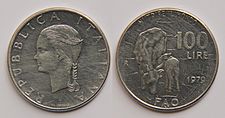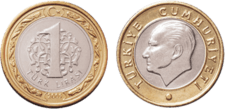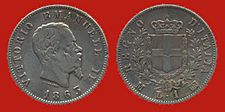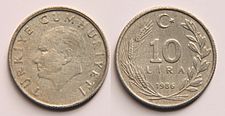Lira facts for kids
| 100 Italian lira (1979, FAO celebration) | |
|---|---|
 |
|
| Obverse: Young woman with braid facing left and Repubblica Italiana (Republic of Italy) written in Italian. | Reverse: Cow nursing calf, face value & date. FAO at bottom and Nutrire il Mondo (English: Feed the world) at top. |
| Coin minted by Italy in 1970s to celebrate and promote the Food and Agriculture Organization. | |
| 1 Turkish lira (2009) | |
|---|---|
 |
|
| Obverse: Mustafa Kemal Atatürk with "TÜRKİYE CUMHURİYETİ" lettering (Republic of Turkey) | |
| 1 Italian lira (1863) | |
|---|---|
 |
|
| Obverse: Victor Emmanuel II | Reverse: Coat of arms of the House of Savoy |
The Lira is the name for several different types of currency (money) used around the world. Today, it is the official money of Turkey, called the Turkish lira. It's also the local name for the money used in Lebanon and Syria.
In the past, the Lira was the currency for countries like Italy, Malta, San Marino, and Vatican City. These countries switched to using the euro in 2002. Israel also used a Lira, but they changed to the old shekel in 1980.
The word "Lira" comes from an old Latin word, libra. This word meant a pound of pure silver. The libra was the basis for the money system in the ancient Roman Empire.
Contents
History of the Lira
From Roman Times to Today
After the Roman Empire, Europe started using a similar money system during the Carolingian Empire. This system was known as £sd, which stood for librae, solidi, and denarii. These were names for different units of money.
This system continued through the Middle Ages and into more recent times in countries like England, France, and Italy. In each country, the word libra was translated into the local language. In England, it became "pound". In France, it was "livre". In Italy, it became "Lira".
The Venetian lira was a very important currency in Italy. Because the Venetian Republic was powerful in trade, the Venetian lira was widely used in the Eastern Mediterranean region.
Lira in the Ottoman Empire
In the 1800s, countries like Egypt and the Ottoman Empire started using the Lira as their main currency. One Lira was equal to 100 piasters or kuruş.
When the Ottoman Empire ended between 1918 and 1922, many new countries were formed. A lot of these new countries continued to use the Lira as their money. For example, in Cyprus, which was part of both the Ottoman and British Empires, people sometimes use "Lira" and "pound" to mean the same thing.
Lira Currency Signs
Different countries use different symbols for their Lira or Pound currencies.
Turkish Lira Sign
For the Turkish lira, the special Turkish lira sign is used. It looks like a big ₺.
Lebanese and Syrian Lira Signs
The Lebanese pound is also called Lira. Its symbol in Arabic is ل.ل.. The Syrian pound (also called Lira in Arabic) uses the symbol £S.
Italian Lira Sign
The main symbol for the Italian lira was L.. However, you might also see symbols like ₤ (with two bars) or £ (with one bar). Sometimes, people used "Lit." before the amount.
Where Lira is Used Now
Turkey
The Turkish lira was first used in 1844, during the time of the Ottoman Empire. Today, the Turkish Lira is the official money of Turkey and the Turkish Republic of Northern Cyprus.
Lebanon and Syria
In Lebanon and Syria, their money is officially called the "pound." However, in Arabic, which is the main language in both countries, they often call it "lira" (ليرة).
Past Currencies Named Lira
Many currencies around the world have been called Lira at some point in history. Here are some of them:
- Cypriot pound, or lira, used from 1879 to 2007.
- French livre, used from 781 to 1794.
- Israeli pound (called לירה "lira" in Hebrew), used from 1948 to 1980.
- Italian lira, used from 1861 to 2002.
- Italian East African lira, used from 1938 to 1941.
- Italian Somaliland lira, used from 1925 to 1926.
- Luccan pound, or lira, used until 1800 and again from 1826 to 1847.
- Maltese lira, used from 1825 to 2007.
- Neapolitan lira, used from 1812 to 1813.
- Ottoman lira, used from 1844 to 1923.
- Papal lira, used from 1866 to 1870.
- Parman lira, used before 1802 and again from 1815 to 1859.
- Sammarinese lira, used from the 1860s to 2002.
- Sardinian lira, used from 1816 to 1861.
- Tripolitanian lira, used from 1943 to 1951.
- Tuscan pound, or lira, used until 1807 and again from 1814 to 1826.
- Vatican lira, used from 1929 to 2002.
- Venetian lira, used from 1472 to 1807.
- The Pound (currency) in some languages is translated as "lira".
 | Tommie Smith |
 | Simone Manuel |
 | Shani Davis |
 | Simone Biles |
 | Alice Coachman |


